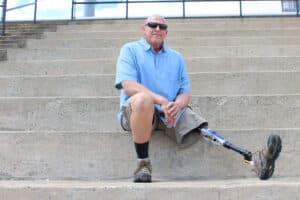
Do you use an above-knee prosthesis? Do you wish you had the opportunity to change a few things about it? Here is your chance to help researchers improve powered knee prosthetic technology. A team of researchers at the University of Michigan Robotics Department would like to invite you to Ann Arbor to participate in a trial that can help them understand how to control powered prostheses during various walking activities.
What is involved in the study? Participants will be asked to perform a few common activities of daily living (ADLs) such as sit-to-stand, level-ground walking, walking up and down stairs, and stepping over obstacles, while wearing a couple different powered prosthetic devices. A motion capture system will record the movements of the participant during these activities.
Why is this study important? Emerging powered leg prostheses can greatly assist individuals with amputations, but these devices are currently designed for a limited set of activities. This study aims to validate a new way to control these devices that will restore the ability to walk in many different activities.
Who is eligible to participate in this study? Adults between the ages of 18-70 who meet all of the following eligibility criteria will be invited to participate:
- Must have a unilateral (single-leg) limb loss or limb difference at the transfemoral level (above-the-knee) and be at least 2 months post-amputation.
- Body weight must not exceed 250 lbs
- Must be K-level 2 or higher and capable of walking for 20 minutes without the use of an assistive device (cane, walker, etc.)
- Must NOT have a cognitive or visual impairment that would prevent giving informed consent or following simple instructions during the experimental protocol
- Must NOT be pregnant or have a health condition that interferes with the study (e.g., neurological or musculoskeletal disorder, pacemaker placement, severe ischemia, cardiac disease)
- Must NOT have an allergy to medical grade tape/adhesive
Is there compensation? All participants will receive compensation for their time. If you live more than two hours from the study site, you may be eligible for travel and lodging reimbursement.
What happens next? For more information and to determine if you are eligible, please contact the study Principal Investigator, Robert Gregg, PhD., at (734) 763-1156 or rdgregg@umich.edu.
Help spread the word! Do you know someone else who uses an above-knee prosthesis? Please ask them to participate too!
To view this and other research studies that you can join, visit our Volunteer Research Opportunities webpage.

